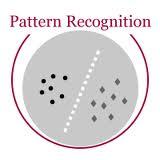Let $P$ be a set of at most $n$ points and let $R$ be a set of at most $n$ geometric ranges, such as for example disks or rectangles, where each $p \in P$ has an associated supply $s_{p} > 0$, and each $r \in R$ has an associated demand $d_{r} > 0$. A (many-to-many) matching is a set $\mathcal{A}$ of ordered triples $(p,r,a_{pr}) \in P \times R \times \mathbb{R}_{>0}$ such that $p \in r$ and the $a_{pr}$'s satisfy the constraints given by the supplies and demands. We show how to compute a maximum matching, that is, a matching maximizing $\sum_{(p,r,a_{pr}) \in \mathcal{A}} a_{pr}$. Using our techniques, we can also solve minimum bottleneck problems, such as computing a perfect matching between a set of $n$ red points $P$ and a set of $n$ blue points $Q$ that minimizes the length of the longest edge. For the $L_\infty$-metric, we can do this in time $O(n^{1+\varepsilon})$ in any fixed dimension, for the $L_2$-metric in the plane in time $O(n^{4/3 + \varepsilon})$, for any $\varepsilon > 0$.
翻译:暂无翻译



